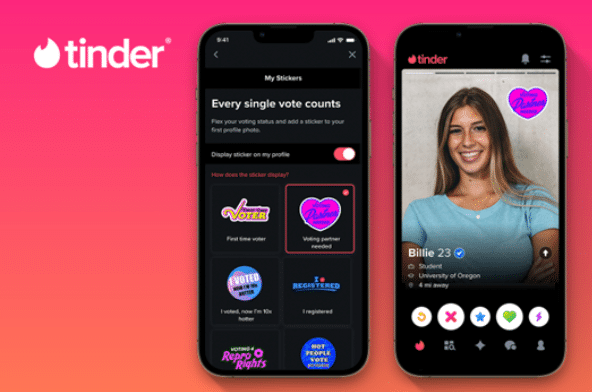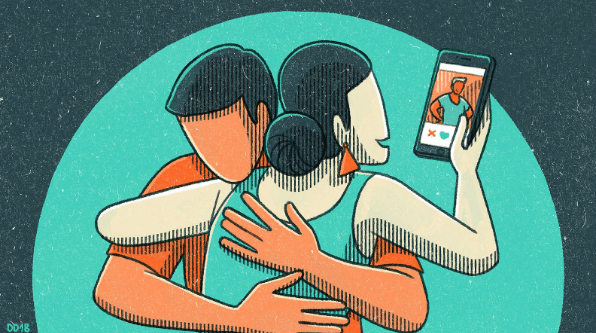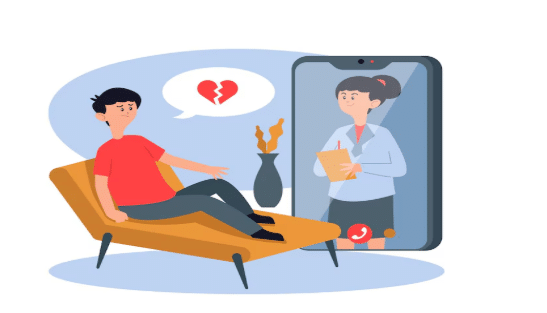Finding Tinder on your partner’s phone can feel like the ground shifting beneath you. The sight alone can spark doubt, anger, and a deep sense of unease.
Questions quickly follow. Is being on Tinder cheating, or is it just idle scrolling? Does swiping mean they’re looking for someone new?
For some, using Tinder while in a relationship is no different from meeting strangers at a bar with hidden intentions. Trust begins to fray.
This article explores the truth about Tinder cheating, how intent shapes perception, and what it means for modern relationships.
Is Using Tinder Cheating? – Key Takeaways
Tinder use in a relationship can blur lines of loyalty. This is always called Tinder cheating when done in secret. Here are some key takeaways:
- Using Tinder while committed often breaks trust
- Intent and secrecy matter more than actions
- Clear boundaries define what counts as cheating
Understanding Tinder And Its Real Purpose
Tinder is a widely used dating app that allows users to create profiles to meet potential partners, sometimes referred to as a Tinder cheating app when used by people in relationships
While initially targeting young adults, it now attracts users of all ages seeking casual hookups or long-term relationships. Its appeal lies in its ease of use and broad dating pool.

The core feature is swiping right to like, left to pass. When two users match, they can chat.
Research shows that many use Tinder for flirting or short-term connections, even when they are already in a relationship.
According to Pew Research Centre, a significant portion of online daters (44%) say they use dating apps to meet a long-term partner.
Source: Pew Research Centre
Why Tinder Use is Generally Considered Cheating
Most relationship experts and partners view active Tinder usage during a committed relationship as a form of infidelity, crossing established boundaries of romantic commitment.

Here’s why this perspective is widely held:
Breach of Trust And Exclusivity
Committed relationships typically operate under an understanding of emotional and physical exclusivity, whether clearly stated or just understood.
Creating or maintaining a Tinder profile contradicts this agreement by signaling availability to potential romantic or sexual partners.
Research shows that the majority of partners consider using dating apps a direct violation of relationship exclusivity and a significant breach of trust.
Intent and Potential For Physical/Emotional Infidelity
Tinder is explicitly designed to support romantic and sexual connections, distinguishing it from non-romantic social media platforms.
Even when physical meetups don’t occur, engaging in flirty conversations constitutes emotional infidelity for many couples.
Studies indicate that emotional affairs often cause relationship damage comparable to physical infidelity, as they redirect intimacy and vulnerability outside the primary relationship.
Secrecy And Deception
Secret Tinder use can make relationship problems worse. Many users hide their activity, delete the app, or create fake profiles.
These actions suggest they know they’re crossing a line. Hiding their behavior shows they’re aware it breaks relationship rules.
The secrecy adds another layer of betrayal, beyond just using the app.
The “Slippery Slope” Argument
What starts as a curiosity or seeking entertainment often leads to more serious boundary violations, which is why people ask, is going on Tinder cheating?
Studies on infidelity patterns show that digital interactions usually start with innocent chats but can escalate to more intimate conversations and, eventually, physical meetings.
This slow progression makes “just browsing” especially concerning, as it creates a path toward deeper infidelity.
Comparison to Traditional Forms Of Cheating
Using Tinder while in a committed relationship is similar to traditional cheating behaviors, like secretly exchanging phone numbers at a bar or attending singles events.
The digital aspect doesn’t lessen the intent, actively seeking romantic or sexual attention outside the relationship.
Many relationship therapists point out that the intentional steps of downloading, setting up, and using a dating app show more intent than some spontaneous in-person infidelities.
Why Do People in Relationships Still Use Tinder?
Despite being in committed relationships, some individuals continue using Tinder for various reasons:
- Validation seeking:
Many crave external compliments and attention to feel desirable when their self-esteem is low. - Boredom:
Some use Tinder as entertainment during monotonous times, treating it like a game rather than a dating tool. - Fear of missing out:
Some people browse potential matches because they worry about overlooking better options or exciting experiences. - Relationship dissatisfaction:
When current relationships lack fulfillment, people sometimes explore alternatives without making a definitive break. - Habit:
For some, checking dating apps became routine before their relationship, and they haven’t adjusted their behavior. - Emotional disconnect:
When emotional needs aren’t met, people might seek understanding and connection from others online.
- Curiosity:
Simple interest in who might find them attractive motivates continued swiping without serious intentions.
Emotional Cheating vs. Physical Cheating In A Tinder Context
In the Tinder world, physical cheating means meeting matches in person for romantic or sexual encounters. It’s direct and crosses relationship boundaries.
Emotional cheating happens when users form deep bonds through intimate conversations. They may flirt or share personal struggles, without any physical contact.

Some people believe only physical actions count as cheating. But many relationship experts say emotional affairs can be just as harmful.
Tinder often blurs the lines, turning casual chats into deep emotional connections. These can feel even more painful than physical cheating.
Tinder Use In A Relationship — What Counts As Cheating?
Different Tinder actions carry different levels of risk. What counts as cheating depends on intent and impact.
Here is a quick table to understand which Tinder actions count as cheating:
| Tinder Action | Is it Cheating | Why It Matters |
|---|---|---|
| Browsing Files | Maybe | Shows curiosity but can still breach trust |
| Swiping Right | Likely | Indicates interest and may lead to a match |
| Flirting in chat | Yes | Emotional Connection outside the relationship |
| Matching with Others | Yes | Open Door to deeper interactions |
| Hiding App Use | Yes | Involves secrecy, which breaks trust |
| Deleting and Reinstalling | Likely | Suggests guilt or intent to hide actions. |
If you have Tinder installed on your device and think that your partner’s perspective might harm the relationship, follow this guide to know how to delete your Tinder account.
Amy North on Tinder and Cheating – Expert Take
In a recent video, relationship coach Amy North argues that Tinder use in a committed relationship can sometimes be more damaging than physical cheating because it shows premeditated intent.
She explains that intention matters, a hidden profile often signals emotional betrayal and a lack of respect for established boundaries.
North highlights that many partners stay on Tinder for validation, flirting, or fear of commitment, which can expose deeper relationship issues.
Her advice is clear: address the situation calmly, define boundaries early, and decide what aligns with your values.
How Can Perspectives Differ For Using Tinder?
Tinder use in relationships sparks varied views. Perspectives depend on shared boundaries, intent behind usage, emotional needs, and mutual understanding—misalignment can trigger trust issues, hurt feelings, and communication breakdowns.
1. The Importance of Agreed-Upon Boundaries
Each couple defines unique limits. What’s vital is mutual consent. Using Tinder without agreement can violate expectations, causing emotional damage, confusion, and a breach of trust in the relationship.
2. “Just Looking” Argument and Intent vs. Action
Claiming to “just browse” ignores Tinder’s intent. An active profile suggests openness to outsiders, potentially breaking emotional fidelity and causing trust issues even if no physical cheating occurs.
3. Emotional Validation vs. Seeking a New Partner
Using Tinder for validation may reflect unmet emotional needs. Though not always about finding someone new, it signals internal or relational gaps needing honest dialogue or professional support.
Consequences Of Using Tinder In A Relationship
Tinder use in relationships brings mixed views, shaped by boundaries, intent, and emotional needs. Misalignment can lead to trust issues, hurt feelings, and breakdowns in communication.
1. Erosion of Trust and Relationship Damage
Secret Tinder use often breaks trust. Even after coming clean, lingering doubts and constant suspicion weaken the emotional connection, making it difficult to restore the original closeness in the relationship.
2. Emotional Distress and Hurt for the Partner
Discovering a partner’s dating profile triggers deep emotional pain, feelings of betrayal, shame, and anxiety. The emotional impact can linger, affecting the betrayed partner’s mental health and sense of security.
3. Potential for Breakup or Divorce
Tinder use during a relationship often leads to breakups. It’s seen as deliberate and premeditated, making forgiveness harder and indicating the partner may have been seeking someone new.
Bonus: If you find yourself to be the one cheating, here’s how to apologize for cheating and really mean it.
What Do Experts Say, Tinder Use Betrayal?
Research shows that 18-25% of Tinder users are already in committed relationships. Most relationship experts consider this behavior problematic, as it signals availability to potential partners while committed elsewhere.
Source: Science Direct

A Deseret News study found that 63% of respondents consider maintaining dating profiles definite cheating. Therapists emphasize that digital boundaries are crucial in modern relationships, with many viewing online dating activity as a significant breach of trust.
Source: Desert News Study
Elisabeth Timmermans’ research revealed personality traits among partnered Tinder users, including higher scores in psychopathy and neuroticism. Experts note that even without physical meetups, the secretive nature and intentions behind dating app use often cause substantial relationship damage.
What To Do If You Find Tinder On Your Partner’s Phone
Finding dating apps on your partner’s phone can be shocking and painful. Before reacting impulsively, consider these balanced steps:
- Take a moment to breathe:
Strong emotions are natural, but decisions made in extreme states often lead to regret. - Avoid immediate accusations:
Approach the conversation seeking understanding rather than attacking. - Have a direct conversation:
Choose a private moment to calmly express what you found and how it made you feel. - Listen to their explanation:
There might be context you’re unaware of (though be mindful of fake excuses). - Reflect on your boundaries:
Consider whether this crosses your definition of acceptable behavior. - Evaluate the relationship honestly:
Look at the overall pattern of trust and respect, not just this incident. - Seek support if needed:
Confide in a trusted friend or consider professional help if you’re struggling to process. - Make a decision based on values:
Whether you choose to work through it or leave, align your choice with your needs.
Remember that only you can determine what feels right for your situation; there is no universal “correct” response when trust is questioned.
Relationship Tips:
Conclusion: Using Tinder Can Turn Into Cheating If Your Partner Doesn’t Know
Using Tinder while you’re in a relationship can easily create confusion, even if you don’t plan to meet anyone. The secrecy or attention from others can feel like emotional cheating and make your partner doubt your intentions.
Even small actions, like keeping a profile or casually swiping, can raise trust issues. That’s why many people see Tinder use in a relationship as crossing personal boundaries.
Healthy boundaries come from being honest about what feels okay for both partners. If dating apps are causing stress, talk about it, set clear expectations, and choose what keeps trust strong.
FAQs
Only if both partners agree; otherwise, it often breaches trust and can be seen as emotional cheating.
If emotional or romantic bonds are formed, many can consider even online-only connections a relationship.
Yes, some couples use Tinder together for open relationships or exploration, but it must be consensual and discussed.
Tinder can lead to relationships, but it’s often geared toward casual connections—apps like Hinge or Bumble may better suit serious intent.
Research shows about 13–20% of users find long-term relationships, though success varies by usage and intent.







